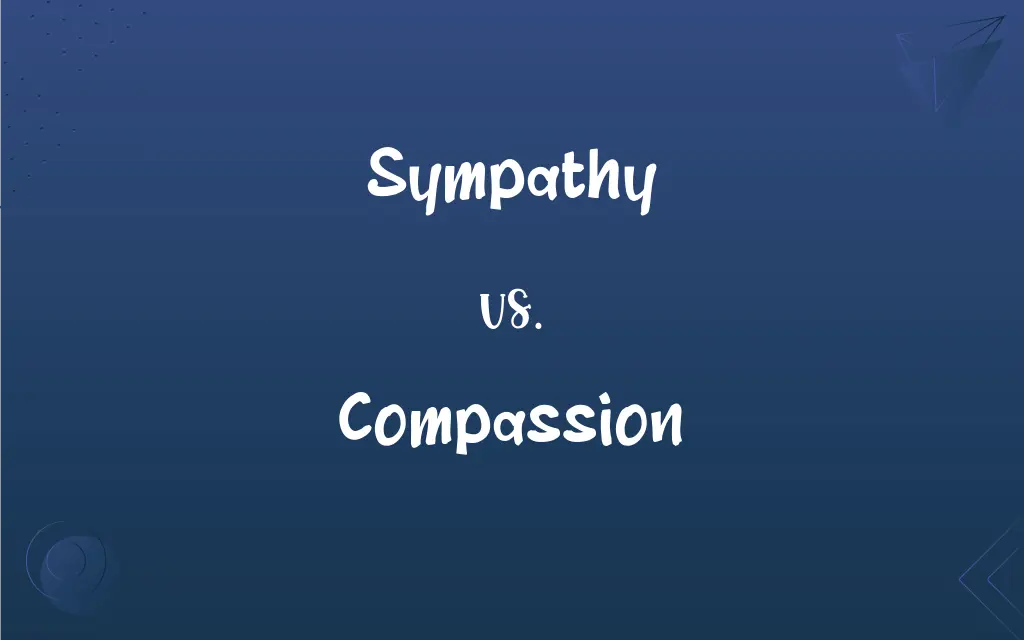Sympathy vs. Compassion: What's the Difference?
Edited by Harlon Moss || By Janet White || Updated on October 7, 2023
Sympathy is feelings of pity and sorrow for someone's misfortune, while compassion is a deeper understanding and a desire to alleviate another’s suffering.

Key Differences
Sympathy and compassion are emotional responses to the plight or suffering of others. Sympathy involves acknowledging another person's emotional hardships and providing comfort and assurance. It can be a shared feeling of sorrow or pity for someone who is experiencing misfortune. Compassion, however, goes a step further, involving a deep awareness of another's suffering coupled with a wish to relieve it.
Sympathy often involves a level of detachment; one may feel sorry for someone but not necessarily feel driven to help. It is an acknowledgment of distress and a sharing of feelings, but it does not inherently include a motivational aspect to alleviate suffering. On the other hand, compassion is active and involves both an emotional and a motivational component to reduce suffering, often leading to acts of kindness, generosity, and support.
The emotional involvement in sympathy can be less profound as compared to compassion. Sympathy might lead to feelings of pity and sorrow for someone else’s situation, allowing one to offer condolences. In contrast, compassion implies a deeper level of concern, emphasizing understanding, connection, and a genuine desire to help and support, thus promoting proactivity in assisting others.
While sympathy can be seen as a precursor to compassion, being a starting point to understanding others' emotions, compassion includes a stronger drive to take action. Sympathy might create a connection between individuals based on shared feelings or mutual understanding of pain, but compassion builds upon this connection to foster a deeper bond and a desire to actively alleviate the distress.
Sympathy and compassion, though distinct, are both vital elements of human interaction and connection. Sympathy allows for acknowledgment and sharing of emotions, providing a sense of understanding and support. Compassion takes it further by instigating actions that manifest empathy and kindness, thereby creating a more profound and impactful connection.
ADVERTISEMENT
Comparison Chart
Definition
Feelings of pity and sorrow for someone's misfortune.
A deep awareness and desire to alleviate another’s suffering.
Involvement
Emotional acknowledgment and shared feelings.
Deeper emotional involvement and a wish to help.
Action
May or may not lead to action to help.
Generally leads to actions to alleviate suffering.
Depth
Can be more superficial and detached.
Involves a deeper connection and understanding.
Outcome
Provides comfort and assurance through understanding.
Actively seeks to reduce the suffering of others.
ADVERTISEMENT
Sympathy and Compassion Definitions
Sympathy
Sympathy is the ability to understand someone else’s feelings.
The counselor showed great sympathy and understanding.
Compassion
Compassion is marked by acts of kindness and generosity to relieve suffering.
The teacher’s compassion led her to spend extra time with struggling students.
Sympathy
It is the sharing of feelings with another person, usually feelings of sorrow.
He felt sympathy for his friend's struggle.
Compassion
Compassion is a profound awareness of and a desire to alleviate the suffering of others.
The nurse showed great compassion to her patients.
Sympathy
Sympathy is a mutual association or relationship between persons or things.
There’s a clear sympathy between the two authors' writing styles.
Compassion
It is an emotional response to sympathize and provide comfort to those in distress.
Compassion drives many to volunteer to help the less fortunate.
Sympathy
A feeling of pity or sorrow for the distress of another; commiseration.
Compassion
It involves empathy and a desire to improve the well-being of others.
The charity works with compassion to improve living conditions for the poor.
Sympathy
Often sympathies An expression of such feeling
Offered her sympathies to the mourning family.
Compassion
Deep awareness of the suffering of another accompanied by the wish to relieve it.
Sympathy
Mutual understanding or feeling between people
"Like two frightened children, we sought at the same time to comfort one another, so quick was the sympathy between us" (Nicholas Meyer).
Compassion
Deep awareness of the suffering of another, coupled with the wish to relieve it.
Sympathy
Agreement with or support for an opinion or position
The mayor is in sympathy with the proposal.
Compassion
(obsolete) To pity.
Sympathy
Often sympathies A tendency to support a position or opinion
A politician of conservative sympathies.
Compassion
Literally, suffering with another; a sensation of sorrow excited by the distress or misfortunes of another; pity; commiseration.
Womanly ingenuity set to work by womanly compassion.
Sympathy
A relationship or affinity between things in which whatever affects one correspondingly affects the other
"Continuous measurements of ionospheric densities ... showed a variation of noon ionization in sympathy with sunspot activity" (E.V. Appelton).
Compassion
To pity.
Sympathy
(Physics) A relation between bodies such that vibrations in one body cause sympathetic vibrations in another.
Compassion
A deep awareness of and sympathy for another's suffering
Sympathy
(Physiology) A relation between parts or organs by which a disease or disorder in one induces an effect in the other.
Compassion
The humane quality of understanding the suffering of others and wanting to do something about it
Sympathy
A feeling of pity or sorrow for the suffering or distress of another.
Compassion
Compassion is the willingness to help and support others in times of trouble.
Acts of compassion can bring positive change to people’s lives.
Sympathy
(in plural) The formal expression of pity or sorrow for someone else's misfortune.
Sympathy
The ability to share the feelings of another.
Sympathy
Inclination to think or feel alike; emotional or intellectual accord; common feeling.
Sympathy
(in plural) Support in the form of shared feelings or opinions.
Sympathy
Feeling of loyalty; tendency towards, agreement with or approval of an opinion or aim; a favorable attitude.
Many people in Hollywood were blacklisted merely because they were suspected of Communist sympathies.
Sympathy
An affinity, association or mutual relationship between people or things such that they are correspondingly affected by any condition.
Sympathy
Mutual or parallel susceptibility or a condition brought about by it.
Sympathy
(art) Artistic harmony, as of shape or colour in a painting.
Sympathy
Feeling corresponding to that which another feels; the quality of being affected by the affection of another, with feelings correspondent in kind, if not in degree; fellow-feeling.
They saw, but other sight instead - a crowdOf ugly serpents! Horror on them fell,And horrid sympathy.
Sympathy
An agreement of affections or inclinations, or a conformity of natural temperament, which causes persons to be pleased, or in accord, with one another; as, there is perfect sympathy between them.
Sympathy
Kindness of feeling toward one who suffers; pity; commiseration; compassion.
I value myself upon sympathy, I hate and despise myself for envy.
Sympathy
The reciprocal influence exercised by organs or parts on one another, as shown in the effects of a diseased condition of one part on another part or organ, as in the vomiting produced by a tumor of the brain.
Sympathy
A tendency of inanimate things to unite, or to act on each other; as, the sympathy between the loadstone and iron.
Sympathy
Similarity of function, use office, or the like.
The adverb has most sympathy with the verb.
Fault,Acknowledged and deplored, in Adam wroughtCommiseration.
Sympathy
An inclination to support or be loyal to or to agree with an opinion;
His sympathies were always with the underdog
I knew I could count on his understanding
Sympathy
Sharing the feelings of others (especially feelings of sorrow or anguish)
Sympathy
A relation of affinity or harmony between people; whatever affects one correspondingly affects the other;
The two of them were in close sympathy
Sympathy
Sympathy is the acknowledgment of another’s sorrow or hardship.
She sent a card to express her sympathy for their loss.
Sympathy
It is the feeling of pity or sorrow for the distress of another.
The community expressed their sympathy to the victims' families.
FAQs
Are sympathy and compassion the same?
No, while sympathy involves understanding and sharing in someone’s sorrow, compassion goes further to include a desire to alleviate the suffering.
Can sympathy lead to compassion?
Yes, acknowledging and understanding another's suffering (sympathy) can often lead to a desire to alleviate that suffering (compassion).
Is compassion stronger than sympathy?
Generally, compassion is considered deeper and more active, involving a desire to help alleviate suffering, whereas sympathy may involve a more passive acknowledgment of another’s distress.
Is sympathy always about sorrow or distress?
While commonly associated with feelings of sorrow, sympathy can also refer to sharing any feelings or a mutual understanding of emotions.
Is compassion a value?
Yes, compassion is considered a fundamental human value in many cultures and ethical systems.
Can you have compassion without empathy?
While empathy, the ability to understand and share the feelings of another, often fuels compassion, it's possible to feel a desire to relieve suffering (compassion) based on moral or ethical principles without feeling empathetic.
Can you feel sympathy without compassion?
Yes, one can understand and share the feelings of another (sympathy) without necessarily feeling a deep desire to alleviate the suffering (compassion).
Can animals show compassion?
While definitive proof is challenging, there are numerous examples and studies suggesting animals can exhibit behaviors interpreted as compassionate, such as providing comfort or help to others in distress.
Can animals show sympathy?
There is evidence to suggest that some animals can exhibit behaviors indicative of sympathy, showing distress at the suffering of others.
Can sympathy be learned?
Yes, through exposure, modeling, and practice, individuals can learn to be more sympathetic to the feelings and situations of others.
Does compassion always involve action?
Typically, compassion involves a motivational component to take action to alleviate suffering, but it can also involve a deep emotional understanding and presence.
Are sympathy and compassion innate or learned?
While there are debates, many believe that humans have an innate capacity for sympathy and compassion, which can be further developed or suppressed based on upbringing, environment, and experiences.
Can compassion be taught?
Yes, compassion can be cultivated and enhanced through various practices, teachings, and experiences that foster understanding and a desire to help others.
Is sympathy an emotion?
Sympathy can involve emotions as it pertains to sharing or understanding the feelings of another, but it is often considered more of a social or interpersonal response.
Is compassion an emotion or a virtue?
Compassion can be both an emotional response to the suffering of others and a virtue, reflecting a moral and ethical disposition to do good and alleviate suffering.
About Author
Written by
Janet WhiteJanet White has been an esteemed writer and blogger for Difference Wiki. Holding a Master's degree in Science and Medical Journalism from the prestigious Boston University, she has consistently demonstrated her expertise and passion for her field. When she's not immersed in her work, Janet relishes her time exercising, delving into a good book, and cherishing moments with friends and family.
Edited by
Harlon MossHarlon is a seasoned quality moderator and accomplished content writer for Difference Wiki. An alumnus of the prestigious University of California, he earned his degree in Computer Science. Leveraging his academic background, Harlon brings a meticulous and informed perspective to his work, ensuring content accuracy and excellence.







































































